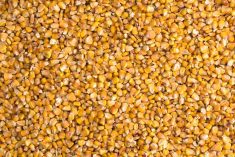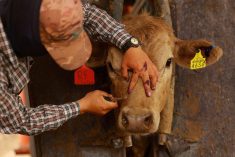(Reuters) –– South Korea said Thursday its meat imports jumped in December to meet lost local supply due to outbreaks of foot-and-mouth, but future import gains might be short-lived even as demand remains steady despite the disease outbreak, industry and government sources said.
South Korea’s combined beef and pork imports increased 13 per cent month-on-month and seven per cent year-on-year to a combined of 57,706 tonnes in December, customs data showed.
South Korea’s exports of beef, pork and poultry meat were all banned due to foot-and-mouth starting from late November and bird flu starting from late December.
Read Also

U.S. grains: Wheat futures rise on supply snags in top-exporter Russia
U.S. wheat futures closed higher on Thursday on concerns over the limited availability of supplies for export in Russia, analysts said.
“We are hearing higher demand (in January) for imported meat,” said an industry source who declined to be identified as he was not authorized to talk to the media.
Meat demand has remained steady in Asia’s fourth-largest economy and is expected to be robust ahead of Chinese New Year in February, but domestic production is seen rebounding quickly afterwards, sources said.
An official at the ministry of knowledge economy said “the government is starting to lift local supply by purchasing those animals that were prevented from being transported to contain foot-and-mouth.”
The nationwide outbreaks of foot-and-mouth, triggering the slaughter about 10 per cent of local pig and cattle population, originated in pigs in the city of Andong in North Gyeongsang province on Nov. 28.
The country exported a total of 79 tonnes of beef and pork in December, down 77 per cent from November and down 96 per cent from a year earlier, the customs statement said.
Another ministry official said it would take at least a half year to resume exports if the country is acknowledged disease-free six months after its last slaughter and vaccination.
South Korea confirmed 116 cases of foot-and-mouth as of Thursday, continuing to rising from 115 cases on Wednesday, the ministry of knowledge economy said in a statement.
On top of the serious outbreaks of foot-and-mouth, South Korea also confirmed the first case of bird flu on Dec. 31 in ducks in the city of Cheonan, South Chungcheong province, and in chickens in the city of Iksan in North Jeolla province.
South Korea said in a second statement on Thursday it had confirmed 23 cases, up from 16 cases a day earlier, of H5N1 avian influenza. The country has no human cases.
Price spike
South Korea’s recent massive slaughter of pork and cattle to contain the outbreak have prompted a spike in domestic beef and pork prices and exacerbating food inflation.
On the Chicago Mercantile Exchange, live cattle and hog prices reached a record high on feed costs, and prospects of increased exports.
An agriculture ministry official, however, said Wednesday the country has no plans to boost imports now or cut import duties. In a statement Wednesday, South Korea said to expand foot-and-mouth vaccination to reach animals across the country except Jeju Island.
The U.S. is the largest exporter of poultry and pork to South Korea and the second-largest beef exporter after Australia. Canada is the second-largest pork exporter to South Korea.
South Korea imposes about 40 per cent of tariffs on imported beef, and about 25 per cent of tariffs on imported pork.
— Cho Mee-young writes for Reuters from Seoul.















